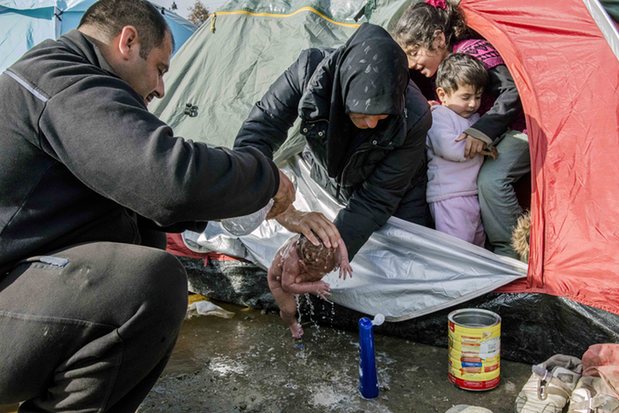Greece to let refugees pass borders upon baby wash photo
People to be moved from Macedonian border within a week after image shows newborn being washed over bare earth

The Greek minister for refugees has vowed to move people from a squalid camp on the Macedonian border within a week, as a photograph emerged of a baby who may have been born in one of the crowded tents.
The arresting image showed the infant being washed with a bottle of water over bare earth outside the makeshift dwellings at the Idomeni refugee camp, where more than 12,000 people are living in deteriorating conditions in the hope of crossing the Greek border.
Sarah Collis, a nurse with the charity Doctors of the World, who has been at the camp for the past two months, said there had been many women in the late stages of pregnancy in the camp but most were taken to local hospitals to give birth.
“Conditions in the camp are truly horrendous, we have not had outbreaks of particular diseases yet but young children are very vulnerable to pneumonia and dehydration from gastroenteritis. Pregnant women who might have complications might have issues getting medical help quick enough.”
Collis herself had recently treated a Syrian woman in her 20s who had given birth in a local hospital five days earlier and was now living in a two-man tent with her newborn, her husband and mother.
“She had a caesarean and she was bleeding late last night, and obviously she was terrified so she sought out the help of the medical tent, and we called an ambulance,” Collis said. “She and the family were living in a tent which wasn’t even waterproof, you wouldn’t even take it to Glastonbury.”
Dimitris Vitsas, the minister charged with coordinating the refugee situation, reiterated the government’s promise to move the stranded men, women and children to reception centres within a week.
“I hope the situation at Idomeni is resolved within a week without recourse to force,” Vitsas told the country’s Mega TV station on Saturday.
Greece will have capacity for 50,000 people in the reception centres, 10,000 more than currently available.
Vitsas said the government hoped to convince refugees to accept the transfers to reception centres, with 400 having moved to facilities in northern Greece on Friday.
Officials had been handing out flyers to the refugees asking them to consent to the move because border closures meant there was “no hope” they could take the western Balkan route to northern Europe.
On Monday, European Union leaders reached a provisional “one-for-one” agreement with Turkey that the country would take back refugees landing in Greece, in return for Syrian refugees being resettled from Turkey in Europe.
Greece has already begun sending back dozens of people who it says do not qualify as asylum seekers under international law, many from Pakistan and north Africa.
The plan, the legality of which has been questioned by the UN and other human rights groups, will be finalised at an EU summit on 17 March.
How to submit an Op-Ed: Libyan Express accepts opinion articles on a wide range of topics. Submissions may be sent to oped@libyanexpress.com. Please include ‘Op-Ed’ in the subject line.
- Libya, Mozambique Advance Major Rice Project - January 16, 2025
- Libyan PM Holds Official Talks with Turkish President - January 16, 2025
- Analysis: Examining the Terms of Gaza’s New Ceasefire Agreement - January 16, 2025


